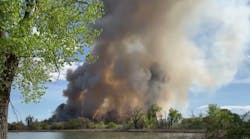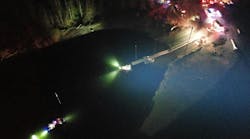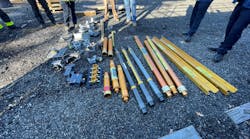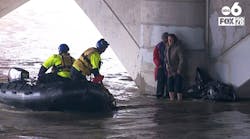Mike and Karen Jones settled in for a lazy day at the beach, kids making sandcastles nearby, waves lapping the sugary sand.
''Oh, my God! Shark!'' Breaking the calm, the scream prompted a mad scramble that beachgoers likened to a scene out of Jaws. Scooping up kids playing in the surf, dozens sprinted out of the water.
Except for Mike Jones.
The 42-year-old state computer technician from Tallahassee charged straight into the reddening waters where 16-year-old Craig Adam Hutto, with the help of his brother, tried to escape the death grip of a bull shark. The two boys had been angling for red fish and sea trout on a sandbar no more than 60 yards from shore in waist-deep water.
The shark pursued the boy to knee-deep water, its head sticking out for all to see. It finally was beaten back by the two boys and Jones.
Were it not for the couple -- Karen Jones is a seasoned trauma nurse who rendered aid with four others -- Hutto would likely have bled to death Monday morning in front of his family, according to witnesses, doctors and Gulf County's sheriff and paramedic chief. Hutto's leg was amputated later that day. The boy from Lebanon, Tenn., was in critical condition Tuesday and faces more surgery.
Hutto was lucky enough to have nearby the Joneses, two other nurses, a pediatrician and a firefighter who helped coordinate the sandy treatment center of beach towels and inflatable rafts.
In a press briefing Tuesday, Gulf County Sheriff Dalton Upchurch noted the contribution of Bruce Blaize, a firefighter captain vacationing from Patoka, Ind. Blaize later deflected the praise, and pointed to the Joneses.
''I'm no hero. If you want to see heroes, you talk to that man and that woman,'' he told The Herald.
The Joneses, though, also resist the title. Mike Jones said the boy's brother is the hero. The Hutto family won't talk to reporters. And Karen Jones, 39, even expressed a sense of guilt Tuesday morning for trying to keep her husband safe and onshore when he rushed to Hutto's rescue.
'I was screaming, 'Don't go out there,' 'cause I saw the boy and I saw the blood. And as ashamed as I am to say it, I was running after him, saying 'Please, don't do this,' '' she told The Herald from the family's rental beach home, her hands trembling.
During the attack, she followed her husband into the water up to her ankles. Then she froze.
'I saw the shark. At first, it was all over the place. It wouldn't go away and I thought, 'Oh, my God. There's two of them.' And then I was looking at it and I said 'No, that's just one.' And it was like, everywhere. And I thought that my husband and the other guy would get bit, too,'' she said.
Mike Jones didn't hear his wife. His eyes were locked on the flailing boy, his ears on the boy's screams.
''Get this thing off me! Get me out of the water,'' Hutto pleaded, according to Mike Jones and others. Jones said he rushed out so fast that he had no idea how far from shore or how deep he was. He grabbed one of Hutto's arms as the boy's brother tugged on the other.
That's when Jones saw the big brown head, at least a foot wide, and chomping. The water was only knee-deep, providing everyone on the beach a glimpse of the bull shark's telltale fat head.
''When I saw the shark still had ahold of him, that's when I realized it probably wasn't a very good idea to go in there. It was just a reaction,'' he said.
Hutto's brother punched the shark repeatedly, and it finally swam away as he and Jones dragged the boy to shore. His right thigh was cleaved to bone. Karen Jones and Blaize knew time was running out, with the boy's blood pumping from his arteries.
Karen Jones, consulting with Blaize, clenched her fists and dug them into Hutto's thigh at the femoral artery, leaning into it with all her might and diminutive weight to stanch the blood flow.
''He was unusually calm, and he was in shock. He was very brave, very brave,'' she said.
''Am I going to die?'' he asked her repeatedly.
''No, you are safe,'' she said. It took so much pressure to keep the blood flow staunched that her arms went numb, she said.
About 40 minutes after the first call came in, a rescue helicopter arrived and set down in an improvised landing zone cleared by the firefighters in the middle of Cape San Blas' main road. Hutto was flown to Bay Medical Center in Panama City.
Dr. Reed Finne, a center surgeon, said Tuesday that Hutto's leg had to be amputated due to severe nerve damage.
The attack on Hutto took place two days after an unrelated shark attack off Destin, 80 miles west along Florida's Panhandle. A 14-year-old girl, Jamie Marie Daigle of Gonzales, La., died from blood loss after a six-foot bull shark mutilated her leg.
Responding to Monday's attack, Gulf County's commissioners closed public beaches -- none of which have lifeguards -- until 11 a.m. Tuesday. The beach was reopened after the sheriff's office patrolled by helicopter. The crew saw nothing unusual. But it did see sharks, common at this time of year as they chase baitfish swimming close to shore.
''We're in Florida,'' Sheriff Upchurch said. ''I'm going to tell you what. If you'll go get in the water, get in a boat, go out about 100 feet, stop and look -- anywhere in this state -- I'll guarantee you, you're probably going to see one before very long. You can do that anywhere from Key West to Pensacola to Jacksonville. You're not going to sit there long before you see a shark. It's just what happens here.''
But when the beaches reopened on a drizzly morning, no one went in. Reporters teemed the shore, almost outnumbering fishermen and beach strollers, who mostly hail from Georgia and Tennessee.
Many said they'd probably re-enter the ocean -- but much closer to shore, in shallower water and with greater overall caution. Many noted the statistics -- repeated by Upchurch and other county officials -- that this is the first recorded attack in county history and that a person has a greater chance of getting hit by lightning or an automobile than being bitten by a shark.
However, Hutto's decision to fish in waters where baitfish-chasing sharks come closer to shore could have played a role in the bite. Both Joneses questioned the accuracy of reports that Hutto had bait in his pockets during the attack.
Karen Jones said Hutto and his family didn't do anything out of the ordinary.
''They were such a happy family,'' she said. ''They were just doing the average Brady-Bunch thing on the beach, having a good time.''
Distributed by the Associated Press





